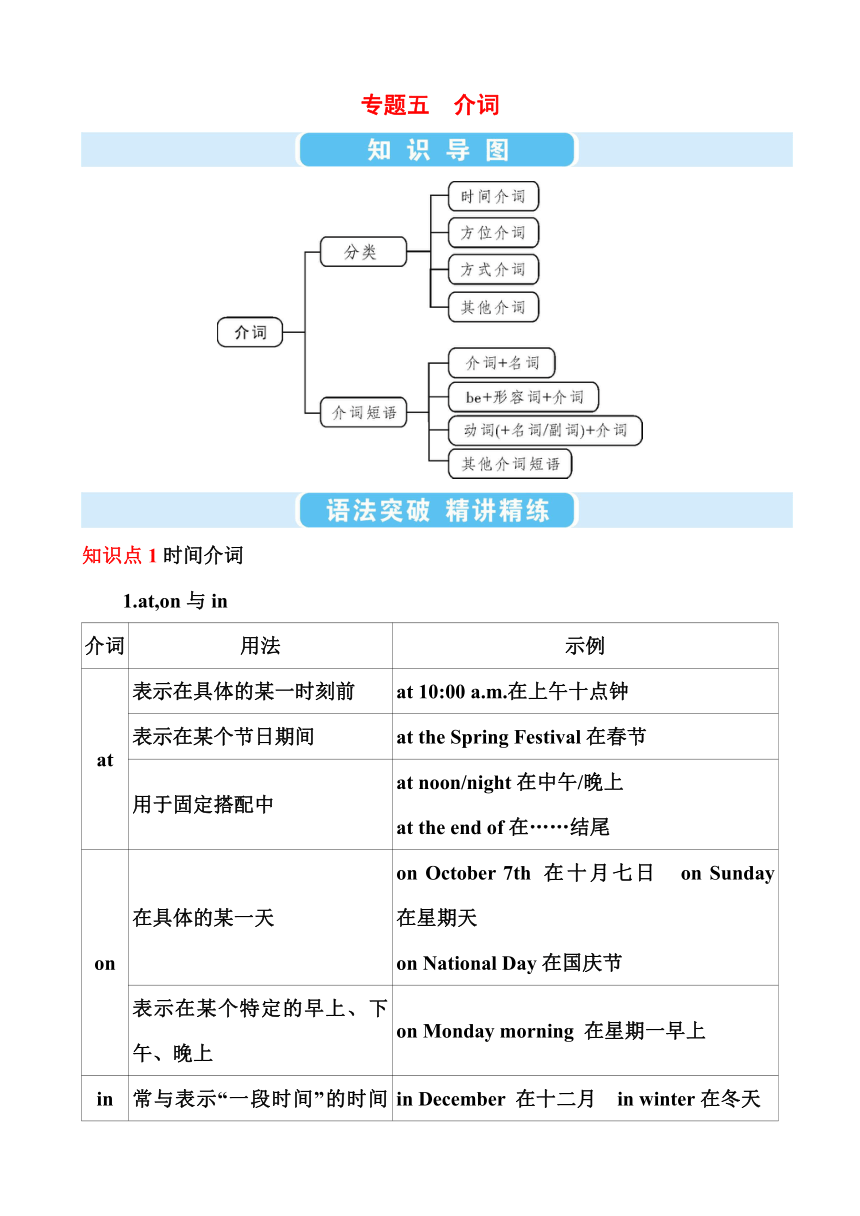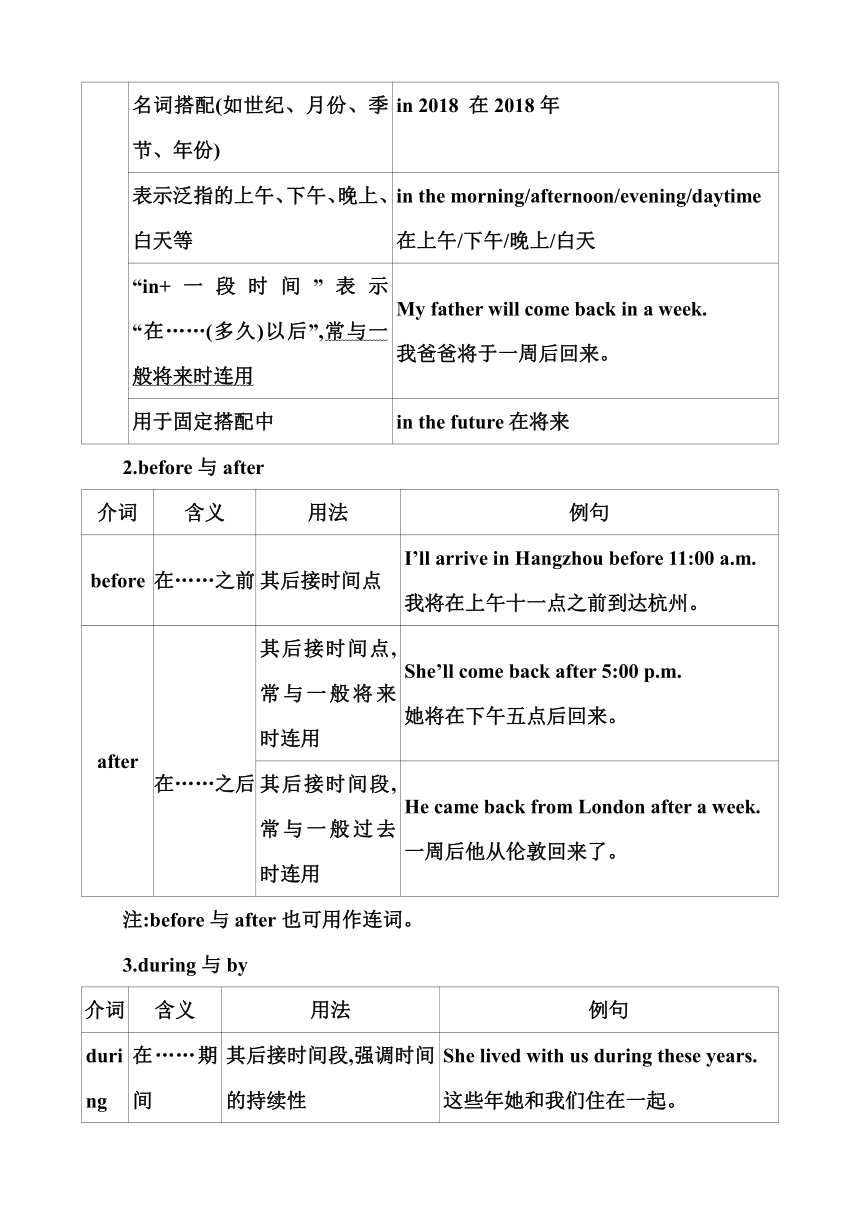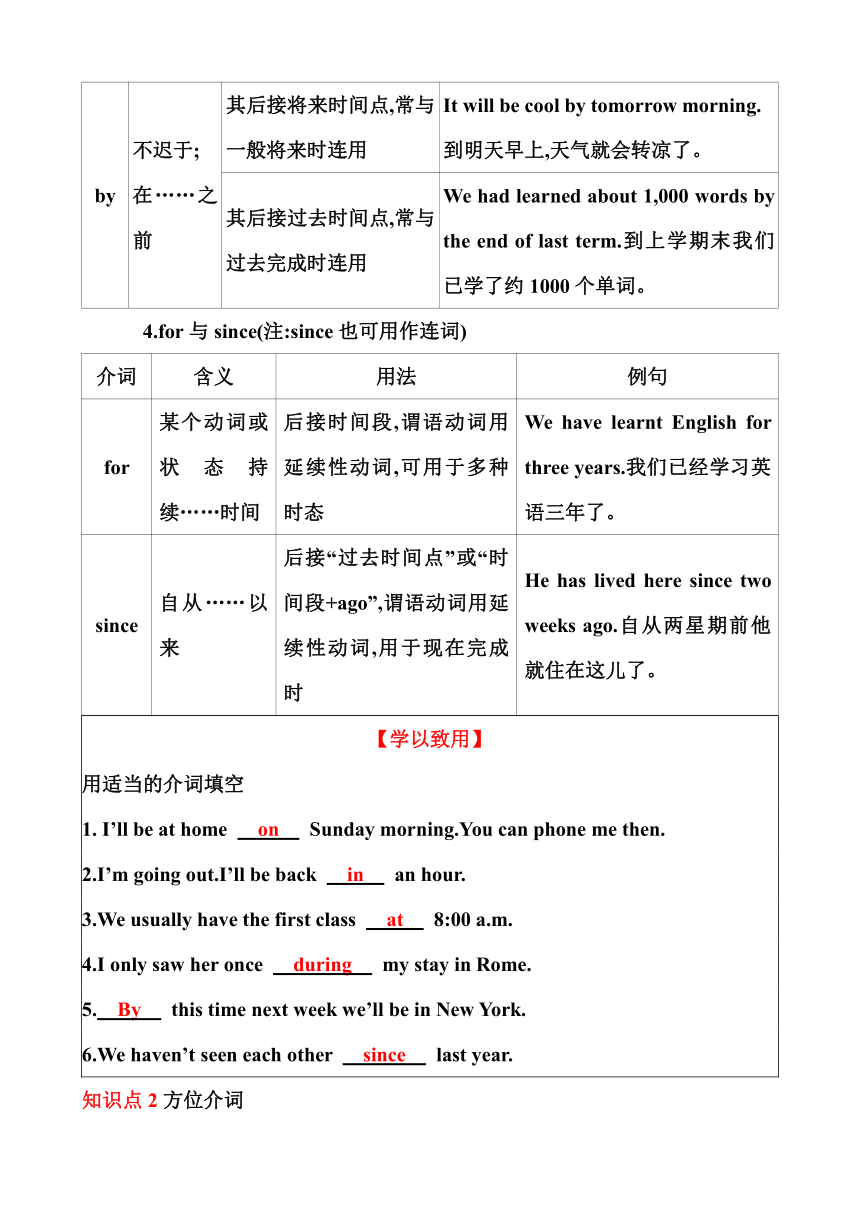05 专题五 介词学案 2025年中考英语语法精讲(人教版)
文档属性
| 名称 | 05 专题五 介词学案 2025年中考英语语法精讲(人教版) |

|
|
| 格式 | docx | ||
| 文件大小 | 403.4KB | ||
| 资源类型 | 教案 | ||
| 版本资源 | 人教新目标(Go for it)版 | ||
| 科目 | 英语 | ||
| 更新时间 | 2024-12-17 10:42:27 | ||
图片预览




文档简介
专题五 介词
知识点1时间介词
1.at,on与in
介词 用法 示例
at 表示在具体的某一时刻前 at 10:00 a.m.在上午十点钟
表示在某个节日期间 at the Spring Festival在春节
用于固定搭配中 at noon/night在中午/晚上 at the end of在……结尾
on 在具体的某一天 on October 7th 在十月七日 on Sunday 在星期天 on National Day在国庆节
表示在某个特定的早上、下午、晚上 on Monday morning 在星期一早上
in 常与表示“一段时间”的时间名词搭配(如世纪、月份、季节、年份) in December 在十二月 in winter在冬天 in 2018 在2018年
表示泛指的上午、下午、晚上、白天等 in the morning/afternoon/evening/daytime 在上午/下午/晚上/白天
“in+一段时间”表示“在……(多久)以后”,常与一般将来时连用 My father will come back in a week. 我爸爸将于一周后回来。
用于固定搭配中 in the future在将来
2.before与after
介词 含义 用法 例句
before 在……之前 其后接时间点 I’ll arrive in Hangzhou before 11:00 a.m. 我将在上午十一点之前到达杭州。
after 在……之后 其后接时间点,常与一般将来时连用 She’ll come back after 5:00 p.m. 她将在下午五点后回来。
其后接时间段,常与一般过去时连用 He came back from London after a week. 一周后他从伦敦回来了。
注:before与after也可用作连词。
3.during与by
介词 含义 用法 例句
during 在……期间 其后接时间段,强调时间的持续性 She lived with us during these years. 这些年她和我们住在一起。
by 不迟于; 在……之前 其后接将来时间点,常与一般将来时连用 It will be cool by tomorrow morning. 到明天早上,天气就会转凉了。
其后接过去时间点,常与过去完成时连用 We had learned about 1,000 words by the end of last term.到上学期末我们已学了约1000个单词。
4.for与since(注:since也可用作连词)
介词 含义 用法 例句
for 某个动词或状态持续……时间 后接时间段,谓语动词用延续性动词,可用于多种时态 We have learnt English for three years.我们已经学习英语三年了。
since 自从……以来 后接“过去时间点”或“时间段+ago”,谓语动词用延续性动词,用于现在完成时 He has lived here since two weeks ago.自从两星期前他就住在这儿了。
【学以致用】
用适当的介词填空
1. I’ll be at home on Sunday morning.You can phone me then.
2.I’m going out.I’ll be back in an hour.
3.We usually have the first class at 8:00 a.m.
4.I only saw her once during my stay in Rome.
5. By this time next week we’ll be in New York.
6.We haven’t seen each other since last year.
知识点2方位介词
1.at与in
介词 用法 示例
at 表示地点时,多指较小的地方或某一点的具体位置(如学校、家等) at home在家 at the station在车站
in 表示地点时,多指较大的地方(如国家、城市等) in China在中国 in Shanghai在上海
2.in,on与to
介词 用法 例句
in 表示在某一地区的某方位(在该范围以内) China is in the east of Asia.中国在亚洲东部。
on 表示与某地的相邻关系(两地接壤) Hubei is on the north of Hunan.湖北在湖南的北边。
to 表示在某一地区之外的某方位(不属于该范围) Japan is to the east of China.日本在中国的东边。
【图解助记】
3.over,above,on,under与below
介词 含义 例句
over 在……正上方(垂直,两者不接触) There is a bridge over the river.河上有一座桥。
above 在……的上方(不一定垂直,两者不接触) Raise your arms above your head.把手臂举过头顶。
on 在……上面(两者接触) There is a book on the desk.桌子上有一本书。
under 在……正下方(垂直,两者不接触) My football is under the chair.我的足球在椅子下面。
below 在……的下方(不一定垂直,两者不接触) He dived below the surface of the water.他潜入了水中。
【图解助记】
4.across,through,over与past
(讲解详见第一编七下Units 5—8知识点1)
5.其他方位介词
near 在……附近 next to 在……旁边,附近 beside 在……旁边
(a)round在……周围 behind 在……后面 inside 在……里面
outside 在……外面 along 沿着 across from/opposite 在……对面
【学以致用】
用适当的介词填空(每空一词)
1.The man arrived at the station this morning.
2.Russia lies on the north of China.
3.The writer’s name was printed below the title of the book.
4.—Oh,my dear!I’ve left my keys in the room.I’ll have to get in through the window.
—It’s dangerous.You’d better wait for your dad to come back.
5.We sat opposite each other,so I could see his face clearly.
知识点3方式介词
by,with,in与on
介词 含义及用法 例句
by 表示“以……方式、方法或手段”,常与表示交通工具的名词连用 She usually goes to school by bike. 她通常骑自行车去上学。
with 表示“用……工具、材料、身体的某一部分或器官” People often eat with chopsticks in China. 在中国人们通常用筷子吃饭。
in 表示“用……语言、语调、颜色等” What’s this in English 这个用英语怎么说
on 表示“用网络、电视、收音机、电话等” They talk on the phone every day.他们每天在电话上交谈。
【学以致用】
用适当的介词填空
1.It’s very convenient to travel from one city to another by high-speed train in China.
2.He spoke in a loud voice.
3.I learn English by keeping a diary in English.
4.Cut the orange with the knife.
5.My brother loves watching game shows on TV.
知识点4其他介词
【学以致用】
用适当的介词填空
1.A person’s life is like a road with lots of difficulties.
2.Wild animals are our friends.We shouldn’t kill them for their meat or fur.
3.Chinese will be widely used as a foreign language in the world.
4.His father wanted him to be a doctor.However,he went against his father’s will and became a teacher.
5.Hearing the shocking news,he left the room without saying anything.
知识点5介词短语
介词作为虚词,不能单独使用,常与名词等构成介词短语或与动词等搭配使用。
构成 短语
介词+名词 in excitement 激动地 to one’s joy 令人开心的是 at birth 出生时
be+形容词+介词 be excited about 对……感到激动 be interested in 对……感兴趣
动词+介词 look at 看着…… run after 追逐…… take with 随身携带……
其他介词短语 come up with 想出…… get along with 与……相处
【学以致用】
用适当的介词填空
1.The teacher advised the couple to talk with their son in person.
2.They came up with a good idea to keep their classroom clean and tidy.
3.Although Nick is tall and strong now,he weighed only two kilograms at birth.
4.—What’s WWF exactly,Millie
—It stands for World Wide Fund for Nature.
5. To my surprise,the twins have nothing in common.
知识点1时间介词
1.at,on与in
介词 用法 示例
at 表示在具体的某一时刻前 at 10:00 a.m.在上午十点钟
表示在某个节日期间 at the Spring Festival在春节
用于固定搭配中 at noon/night在中午/晚上 at the end of在……结尾
on 在具体的某一天 on October 7th 在十月七日 on Sunday 在星期天 on National Day在国庆节
表示在某个特定的早上、下午、晚上 on Monday morning 在星期一早上
in 常与表示“一段时间”的时间名词搭配(如世纪、月份、季节、年份) in December 在十二月 in winter在冬天 in 2018 在2018年
表示泛指的上午、下午、晚上、白天等 in the morning/afternoon/evening/daytime 在上午/下午/晚上/白天
“in+一段时间”表示“在……(多久)以后”,常与一般将来时连用 My father will come back in a week. 我爸爸将于一周后回来。
用于固定搭配中 in the future在将来
2.before与after
介词 含义 用法 例句
before 在……之前 其后接时间点 I’ll arrive in Hangzhou before 11:00 a.m. 我将在上午十一点之前到达杭州。
after 在……之后 其后接时间点,常与一般将来时连用 She’ll come back after 5:00 p.m. 她将在下午五点后回来。
其后接时间段,常与一般过去时连用 He came back from London after a week. 一周后他从伦敦回来了。
注:before与after也可用作连词。
3.during与by
介词 含义 用法 例句
during 在……期间 其后接时间段,强调时间的持续性 She lived with us during these years. 这些年她和我们住在一起。
by 不迟于; 在……之前 其后接将来时间点,常与一般将来时连用 It will be cool by tomorrow morning. 到明天早上,天气就会转凉了。
其后接过去时间点,常与过去完成时连用 We had learned about 1,000 words by the end of last term.到上学期末我们已学了约1000个单词。
4.for与since(注:since也可用作连词)
介词 含义 用法 例句
for 某个动词或状态持续……时间 后接时间段,谓语动词用延续性动词,可用于多种时态 We have learnt English for three years.我们已经学习英语三年了。
since 自从……以来 后接“过去时间点”或“时间段+ago”,谓语动词用延续性动词,用于现在完成时 He has lived here since two weeks ago.自从两星期前他就住在这儿了。
【学以致用】
用适当的介词填空
1. I’ll be at home on Sunday morning.You can phone me then.
2.I’m going out.I’ll be back in an hour.
3.We usually have the first class at 8:00 a.m.
4.I only saw her once during my stay in Rome.
5. By this time next week we’ll be in New York.
6.We haven’t seen each other since last year.
知识点2方位介词
1.at与in
介词 用法 示例
at 表示地点时,多指较小的地方或某一点的具体位置(如学校、家等) at home在家 at the station在车站
in 表示地点时,多指较大的地方(如国家、城市等) in China在中国 in Shanghai在上海
2.in,on与to
介词 用法 例句
in 表示在某一地区的某方位(在该范围以内) China is in the east of Asia.中国在亚洲东部。
on 表示与某地的相邻关系(两地接壤) Hubei is on the north of Hunan.湖北在湖南的北边。
to 表示在某一地区之外的某方位(不属于该范围) Japan is to the east of China.日本在中国的东边。
【图解助记】
3.over,above,on,under与below
介词 含义 例句
over 在……正上方(垂直,两者不接触) There is a bridge over the river.河上有一座桥。
above 在……的上方(不一定垂直,两者不接触) Raise your arms above your head.把手臂举过头顶。
on 在……上面(两者接触) There is a book on the desk.桌子上有一本书。
under 在……正下方(垂直,两者不接触) My football is under the chair.我的足球在椅子下面。
below 在……的下方(不一定垂直,两者不接触) He dived below the surface of the water.他潜入了水中。
【图解助记】
4.across,through,over与past
(讲解详见第一编七下Units 5—8知识点1)
5.其他方位介词
near 在……附近 next to 在……旁边,附近 beside 在……旁边
(a)round在……周围 behind 在……后面 inside 在……里面
outside 在……外面 along 沿着 across from/opposite 在……对面
【学以致用】
用适当的介词填空(每空一词)
1.The man arrived at the station this morning.
2.Russia lies on the north of China.
3.The writer’s name was printed below the title of the book.
4.—Oh,my dear!I’ve left my keys in the room.I’ll have to get in through the window.
—It’s dangerous.You’d better wait for your dad to come back.
5.We sat opposite each other,so I could see his face clearly.
知识点3方式介词
by,with,in与on
介词 含义及用法 例句
by 表示“以……方式、方法或手段”,常与表示交通工具的名词连用 She usually goes to school by bike. 她通常骑自行车去上学。
with 表示“用……工具、材料、身体的某一部分或器官” People often eat with chopsticks in China. 在中国人们通常用筷子吃饭。
in 表示“用……语言、语调、颜色等” What’s this in English 这个用英语怎么说
on 表示“用网络、电视、收音机、电话等” They talk on the phone every day.他们每天在电话上交谈。
【学以致用】
用适当的介词填空
1.It’s very convenient to travel from one city to another by high-speed train in China.
2.He spoke in a loud voice.
3.I learn English by keeping a diary in English.
4.Cut the orange with the knife.
5.My brother loves watching game shows on TV.
知识点4其他介词
【学以致用】
用适当的介词填空
1.A person’s life is like a road with lots of difficulties.
2.Wild animals are our friends.We shouldn’t kill them for their meat or fur.
3.Chinese will be widely used as a foreign language in the world.
4.His father wanted him to be a doctor.However,he went against his father’s will and became a teacher.
5.Hearing the shocking news,he left the room without saying anything.
知识点5介词短语
介词作为虚词,不能单独使用,常与名词等构成介词短语或与动词等搭配使用。
构成 短语
介词+名词 in excitement 激动地 to one’s joy 令人开心的是 at birth 出生时
be+形容词+介词 be excited about 对……感到激动 be interested in 对……感兴趣
动词+介词 look at 看着…… run after 追逐…… take with 随身携带……
其他介词短语 come up with 想出…… get along with 与……相处
【学以致用】
用适当的介词填空
1.The teacher advised the couple to talk with their son in person.
2.They came up with a good idea to keep their classroom clean and tidy.
3.Although Nick is tall and strong now,he weighed only two kilograms at birth.
4.—What’s WWF exactly,Millie
—It stands for World Wide Fund for Nature.
5. To my surprise,the twins have nothing in common.
同课章节目录
- 词法
- 名词
- 动词和动词短语
- 动词语态
- 动词时态
- 助动词和情态动词
- 非谓语动词
- 冠词
- 代词
- 数词和量词
- 形容词副词及其比较等级
- 介词和介词短语
- 连词和感叹词
- 构词法
- 相似、相近词比较
- 句法
- 陈述句
- 一般疑问句和否定疑问句
- 特殊疑问句及选择疑问句
- 反意疑问句
- 存在句(There be句型)
- 宾语从句
- 定语从句
- 状语从句
- 主谓一致问题
- 简单句
- 并列句
- 复合句
- 主谓一致
- 主、表语从句
- 名词性从句
- 直接引语和间接引语
- 虚拟语气
- 感叹句
- 强调句
- 倒装句
- 祈使句
- 句子的成分
- 句子的分类
- 题型专区
- 单项选择部分
- 易错题
- 完形填空
- 阅读理解
- 词汇练习
- 听说训练
- 句型转换
- 补全对话
- 短文改错
- 翻译
- 书面表达
- 任务型阅读
- 语法填空
- 其他资料
